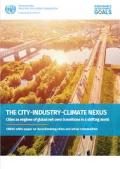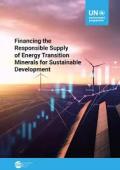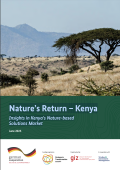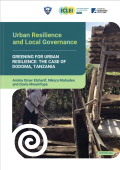
The science is unequivocal that humans are the cause of global warming and major changes are already being observed in recent extreme events. There is alarming evidence that important tipping points, leading to irreversible changes in major ecosystems and the planetary climate system, may already have been reached or passed. The current global mean temperature is about 0.87°C above pre-industrial levels (NASA, 2015) and continues to increase.
One of the most urgent challenges facing countries across the world today is how to achieve economic prosperity and development while also combating climate change.
Relevance to the SDGs
Following the inauguration of Sustainable Development Goal (SDG) 13, the Paris Agreement pledges to keep temperature rise under 2°C and calls for global partnership in combating climate change through mitigation and adaptation measures.
Explore green growth resources related to SDG 13:
Climate change poses a systemic threat to the global economy, as highlighted by the G20’s work through the Task Force for Climate-related Financial Disclosures (TCFD). These risks include physical impacts such as droughts and sea-level rise, transition risks as the economy moves towards low-carbon solutions and technologies, and litigation risks as society seeks redress for damage caused to the environment and economy. The risks are likely to affect all financial institutions and, in many cases, are already impacting returns.
Climate change also presents opportunities for the finance sector, as private sector capital will be needed for mitigation, such as renewable energy and clean transport, and for adaptation, such as smart agriculture and climate-resilient infrastructure. Climate finance targets in the Sustainable Development Goals (SDG 13) call for a major shift in investment patterns towards low-carbon, climate-resilient development.
To achieve global targets set by the Paris Climate Agreement, significant changes will be required to the allocation of capital across the economy. Mechanisms that price carbon emissions, such as carbon trading and climate credit schemes, can raise significant funds for developing countries to invest in projects to address climate change. According to the World Bank, around $US 700 billion of low-carbon investments per year will be required by 2030 from public and private sources.
Climate change has wide-ranging impacts on industry, including increased stress on natural resources, such as water, forests, and soils required for raw materials and production, pollution-related health impacts on workers, and extreme weather that threatens supply chain stability. Businesses can reduce their vulnerability to climate change by adopting measures such as reducing waste, using renewable energy, promoting energy and resource efficiency, sourcing sustainable materials, and implementing green standards. Adopting green practices also helps businesses create more reliable growth paths that reduce climate impacts while increasing business longevity, reduce cost and risk in supply chains, and spur innovation and competitiveness.
Many businesses are partnering with national governments to mitigate their impact on the climate and adapt to the impacts of a changing climate. Their activities range from working with farmers and raw material suppliers to adapt to climate change impacts and adopt more sustainable practices, to helping national and regional governments reduce carbon emissions and create more sustainable infrastructure.













